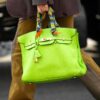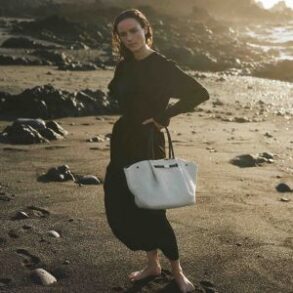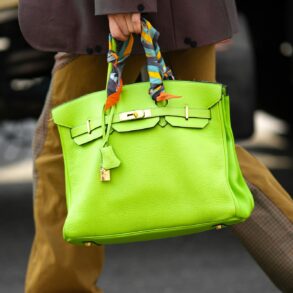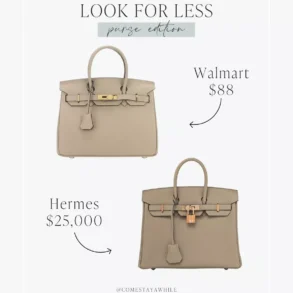
Oroton’s launch of augmented reality screens at two of its stores gives window shopping a whole new meaning, allowing passersby to virtually “try on” five of the brand’s bestselling handbag styles as they walk past.
“This allows us to engage with customers in a totally new way,” said Jenny Child, chief executive of the Will Vicars-owned company. “It’s not forced, you don’t have to come into the store or on the website, it’s quite casual and fun.”




An augmented reality screen at Oroton’s store in the Queen Victoria Building in Sydney. Louie Douvis
The technology, engineered by Zero10, an augmented reality firm based in Cyprus and founded by former fashion designer George Yashin, allows people walking by the store to hold handbags, place them across their body and walk with them.
It does not use facial recognition technology to do so. The screen, which is powered during staffed boutique hours, also randomly selects customers to win a handbag. It is a first for an Australian fashion brand.
Ms Child said the marketing innovation was crucial to Oroton’s growth strategy.
“I want Oroton to be a leader,” she said. “In Australian fashion here, there is a lot of rule-following. There is a playbook of what we do.
“Internationally, there is agenda-setting, like avatar-only runways.” The Australian fashion industry, she noted, “is tentative to do that”.
“Growth is not just a commercial outcome. It’s more than designing a pretty bag, it’s about being relevant and engaged.” Integrating technology like this, said Ms Child, was key to this change.
The fashion retail industry is gearing up for a Christmas season that may struggle to meet the success of the previous two years of post-pandemic lockdowns.
A new Bain & Company report shows that 40 per cent of respondents globally are planning to cut back on spending this year. It mirrors mid-year sales data in Australia, where, despite significant retailer discounting, shoppers pulled back with overall turnover falling 0.8 per cent in June.
In Australia, a crowded market is dominated at the luxury end by international conglomerates and, in fast fashion, by global giants like Zara and H&M, leaving local players sometimes struggling to keep pace.
The Zero10 technology, now being used in Oroton’s Queen Victoria Building store in Sydney and its Queen Street Mall pop-up in Brisbane, will be on display until January. Ms Child said it would likely be the first iteration of augmented reality in Oroton’s stores.
“That’s where technology is taking us,” she said. “It is about creating an immersive experience when you’re shopping from home, or in the store.”
While in-store virtual try-on is not yet available, it is an innovation Ms Child is interested in pursuing.
“Right now it’s about engaging with more people than we otherwise would, and capturing that market who might not come into our store. We haven’t even scratched the surface of that yet.”
This post was originally published on this site be sure to check out more of their content.








